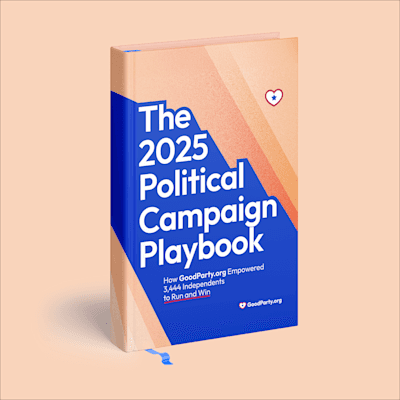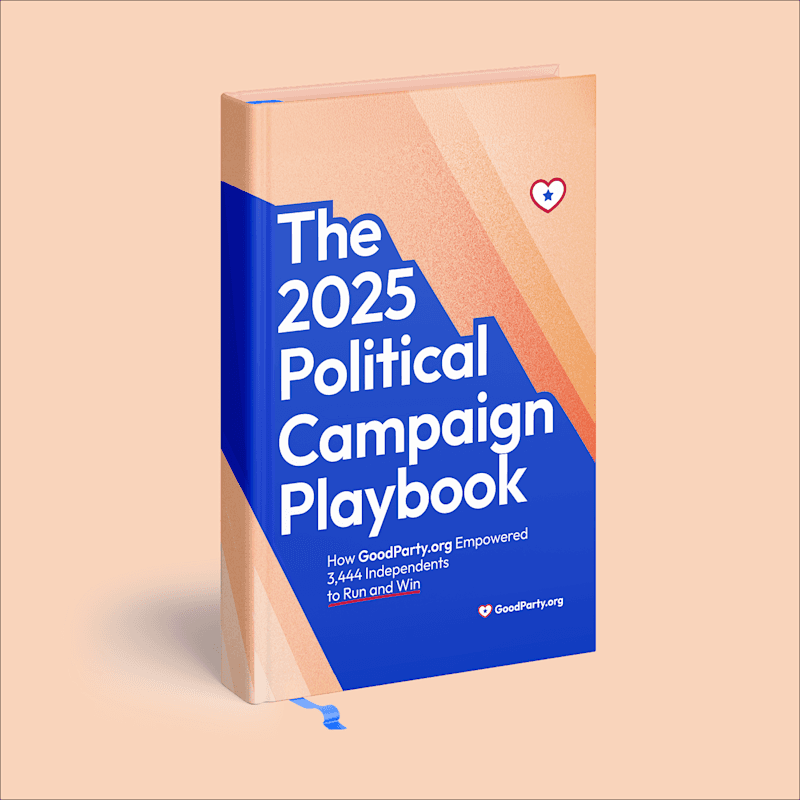
What are Political Donations?
Campaign Finance: The Role of Donations in Politics
In the realm of politics, financial contributions play a significant role in shaping the democratic process. Many feel that money plays an outsized role in elections, but an adequately funded campaign is often directly related to successful election outcomes.
Political spending by individuals and organizations supports candidates, parties, or causes, making such expenditures an integral part of electoral campaigns and policy-making. Even when we're able to separate financial donations from political influence, the need for such funding continues. After all, candidates still need to cover campaign expenses and get their message out to voters.
Our goal is to educate readers about the importance of campaign financing as well as the ethics of making political donations so that we can fund campaigns with transparency and experience real change at every level of governance.
What are Political Donations?
Political donations are financial contributions that are made by individuals, corporations, and organizations to support political campaigns, parties, or initiatives. These contributions are intended to advance the interests of specific candidates or causes and, in many cases, influence the overall political landscape.
While such donations are a legitimate form of civic engagement, there are concerns regarding their potential to unduly influence policy decisions and negatively impact the democratic process. As such, individual political parties and agencies like the Federal Election Commission (FEC) have set guidelines, policies, and regulations regarding the political donation process.
This includes rules regarding individual donor limits and the use of funds.
Types of Political Donations
Political contributions can come from a variety of sources and take various forms. It's important to understand these different types of political funding sources to gain insight into the breadth and potential for financial influence in politics.
The most common types of political giving are:
Direct Campaign Contributions: These are contributions that are made directly to political candidates or parties. Donors might give their money to individual campaigns or donate to party committees that distribute funds to candidates. This can be done by mail, online, or at political fundraising events.
PAC Contributions: Political Action Committees PACs are organizations established to raise and contribute money to support or oppose candidates, parties, and political causes. PACs allow groups of like-minded individuals or organizations to pool their resources and have a collective impact on the political landscape.
For example, Accenture is a Fortune 500 company with global interests involving technology and sustainability. Their PAC routinely donates to candidates that align with their corporate mission and goals.
Super PAC Contributions: In the United States, Super PACs emerged after the landmark Citizens United v. FEC ruling in 2010. These independent expenditure-only committees can raise and spend unlimited funds to advocate for or against political candidates. However, they cannot coordinate directly with the candidates they support.
Bundled Contributions: Some individuals, corporate donors, or organizations engage in bundling. This is the process of collecting contributions from multiple donors and presenting them as a single donation to a candidate or party. Bundling can amplify the influence of individual donors, which raises concerns about transparency.
Soft Money Contributions: Political parties can accept unlimited contributions for general party-building activities. This is referred to as soft money, which differs from hard money in that it isn't directly donated to candidates.
Who Can Make Political Contributions and Who Can't?
In most democracies, individuals, corporations, and organizations are allowed to make donations according to certain political donation regulations and within political contribution limits. Such restrictions exist to prevent undue influence and maintain transparency.
For example, US federal election laws prohibit foreign nationals, registered foreign agents, government contractors, and minors from making contributions. Similarly, there are limits on the maximum amount that an individual or entity can donate. This helps to prevent undue influence by wealthy donors.
The Role of Political Donations: Fueling Democracy or Influencing Policy?
Before making the decision to run for office, candidates and staffers should have a clear understanding of laws regarding political donations and adhere to the highest standards of political financing transparency.
There are many moving parts to the election process, and the impact of political donations can be significant.
For example, the political donor database often serves as the source of lifeblood for candidates who rely on these contributors to finance their campaigns. Funds are used to cover vital expenses like advertising, travel, staff salaries, and voter outreach. Without adequate funding, politicians struggle to reach their constituents and communicate their platforms effectively.
However, donations can also exert significant influence over policy decisions. When candidates receive substantial financial support from certain interest groups, corporations, or wealthy individuals, there's a potential risk of bias in favor of those donors' agendas.
This raises concerns about whether politicians are truly serving the interests of constituents or fulfilling the wishes of their financial backers. It also reinforces the need for accurate campaign finance reports and transparency regarding political donor disclosure.
Supporting Advocacy and Lobbying Efforts
Political donations often extend beyond electoral campaigns. Organizations and individuals may contribute to advocacy groups and lobbyists to promote specific policy initiatives or influence government decisions. These contributions can be instrumental in shaping the legislative agenda.
Therefore, one of the most critical aspects of political donations is transparency. Voters have the right to know who is financially supporting their representatives and influencing the political process. Transparent reporting of political donations can help identify any potential conflicts of interest and hold politicians accountable for their decisions.
Any lack of transparency can become problematic. Dark money, which refers to undisclosed contributions made through nonprofit organizations or other means, can obscure the true source of funding and make it difficult for the public to understand who is behind particular campaigns or policy initiatives.
Campaign Finance Regulations
In response to concerns about the influence of money in politics, many countries have implemented campaign financing regulations. These laws often impose contribution limits, disclosure requirements, and restrictions on the types of entities that can donate. The effectiveness of such regulations can vary, and loopholes may still exist that enable undisclosed or indirect financial influence.
For instance, the United States has experienced a long history of campaign finance reform efforts. The Federal Election Campaign Act (FECA) of 1971 aimed to increase transparency and limit the influence of money in politics. The Bipartisan Campaign Reform Act (BCRA) of 2002 sought to ban soft money contributions to political parties and placed restrictions on issue ads funded by corporations and unions. However, the Supreme Court's 2010 ruling in Citizens United overturned certain provisions of BCRA, opening the door to increased spending by Super PACs and outside groups.
As mentioned previously, that case had a profound impact on campaign finance regulations. The ruling allowed corporations and unions to make independent expenditures in support of or against political candidates, contributing to the rise of Super PACs and increasing the influence of money in politics.
Subsequent efforts to challenge the decision have failed so far.
Ethical Solicitation and Use of Campaign Donations
While political donations are an essential aspect of the democratic process, it's equally important for candidates, parties, and organizations to uphold ethical standards when soliciting and using donated funds. Ethical practices can help maintain the integrity of the electoral process, build trust with the public, and ensure that political contributions are used in ways that align with the interests of the electorate.
This is especially important in the current political climate of mistrust in our institutions and the integrity of our electoral process.
In order to support the highest degree of trust and transparency in political donations, here's a set of guidelines and best practices for ethical solicitation and use of campaign funds:
1. Prioritize transparency.
Transparency is paramount when soliciting campaign donations. Candidates and political parties should be upfront about their fundraising efforts, clearly communicating the purpose of the funds being raised and how they will be used. Transparent fundraising practices inspire confidence among donors and the public, reinforcing the notion that their contributions will be put to legitimate and ethical use.
2. Limit the access of special interests.
To maintain the integrity of the democratic process, it is crucial to minimize the influence of special interests in political fundraising. Candidates and parties should strive to limit donations from lobbyists, corporations, and other entities with vested interests in specific policy outcomes. Instead, the focus should be on grassroots fundraising efforts that rely on support from individual citizens.
3. Emphasize small donations.
Promoting small-dollar donations can help reduce the disproportionate influence of wealthy donors. By emphasizing the importance of contributions from everyday citizens, candidates can create a more inclusive and equitable fundraising environment. Many successful campaigns have utilized online platforms to reach a broader base of donors and encourage small, individual contributions.
4. Avoid conflicts of interest.
Political candidates and elected officials must be vigilant about avoiding even the appearance of conflicts of interest when accepting campaign donations. They should refrain from accepting contributions from individuals or entities that could influence their decision-making on matters that directly benefit those donors. Transparently addressing any potential conflicts of interest can help build public trust in the candidate's integrity.
5. Use donations only for their intended purpose.
Campaign funds should be used solely for financing campaign activities, staff salaries, advertising, and related expenses. Candidates should avoid dipping into donations for personal use or diverting any funds to unrelated ventures. Proper accounting and reporting mechanisms should be put into place to ensure compliance with campaign finance laws.
6. Prioritize ethical campaign messaging.
Campaign messages and advertising should be based on factual information and honest representation of the candidate's positions and plans. Ethical campaign practices avoid misinformation, negative attacks, and manipulative tactics that may compromise the democratic process.
7. Disclose all donors.
Transparency in disclosing donors is essential to maintaining public trust and accountability. Political candidates and parties should make a concerted effort to disclose all contributions in a timely manner. In some countries, campaign finance laws mandate regular reporting of donations and public disclosure of donors' identities to ensure transparency.
8. Avoid quid pro quo arrangements.
Candidates should never promise specific policy outcomes or favors in exchange for campaign donations. Such quid pro quo arrangements undermine the democratic process and can lead to corrupt practices. It's crucial to uphold the principle that campaign contributions should support a candidate's vision and platform, not secure undue influence over policy decisions.
9. Practice independent oversight.
Establishing independent oversight bodies to monitor political financing can be an effective measure to ensure compliance with ethical standards. These bodies can investigate potential violations, audit the campaign coffers, and enforce penalties for any unethical or illegal behavior related to political donations.
By adhering to guidelines that promote transparency, limit special interests, and prioritize small donations, candidates and political parties can foster public trust and ensure that campaign funds make a positive contribution to the democratic process. Ethical practices in political fundraising not only build a more robust and transparent electoral system but also reaffirm the commitment to serve the interests of all citizens.
This is paramount for fostering a stronger and more representative democracy.
What Happens When the Campaign Ends?
While it's common to see campaigns end due to a lack of funds, hard-run elections with broad support often end with a surplus of money. What happens to these donations when the campaign ends?
Under no circumstances can those funds be accessed for the personal use of the candidate or anyone associated with the campaign. This includes tapping into election donations to cover household expenses, giving them as gifts to friends, supporters, or family members, or using the funds for any expenditures that are not directly related to the campaign.
Otherwise, political finance laws allow the use of surplus funds for:
• Charitable donations • Donations to the same candidate in the next election • Donations to a different candidate in the same or a future election • Transfer of the funds to a political party
Keep in mind that transfers of funds or donations could be subject to limits and campaign finance disclosures in accordance with campaign financing regulations at local, state, and federal levels.
Final Thoughts
Political donations play a significant role in the democratic process, providing vital funding for campaigns and supporting political causes. However, the extent of their impact on policy decisions and the potential for undue political donor influence raises concerns about the transparency and accountability of the political system.
That means ethical solicitation and use are paramount to upholding the democratic principles of transparency, fairness, and accountability.
As citizens who are interested in the integrity of our democracy, it's essential to stay informed about election finance regulations, demand transparency from our representatives, and engage in discussions to promote meaningful reform. Only through such efforts can we ensure that political donations serve the greater good and avoid undermining the core principles of democracy.
Are you ready to become the change you want to see in our political system? Take the time to learn more about our growing network of politically savvy and motivated independent volunteers and candidates.
Photo by engin akyurt on Unsplash

